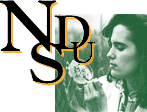 |
|
Scotinophara Stål, 1868
Keys to Species of Scotinophara
Key to species of Scotinophara of
central & west Africa
(modified from Linnavuori, 1982)
|
1 Anterior disk of pronotum with transverse row of four prominent roundish tubercles |
lamottei Villiers |
|
- Anterior disk of pronotum with only slight elevations |
2 |
|
2(1) Anterolateral pronotal tooth long and sharp, usually more or less recurved apically, black |
cornuta Horváth |
|
- Anterolateral pronotal tooth shorter, more or less delicate, at most slightly recurved apically, pale |
3 |
|
|
|
|
3(2) Hypophysis of paramere long and narrow, digitate |
4 |
|
- Form of paramere differing from above |
5 |
|
|
|
|
4(3) Posteroventral margin of pygophore with median lobe triangular |
monticola Villiers |
|
- Posteroventral margin of pygophore with median lobe broad |
yaoundea Linnavuori |
|
|
|
|
5(3) Apical margin of paramere strongly insinuated |
mixta Linnavuori |
|
- Apical margin of paramere not strongly insinuated |
6 |
|
|
|
|
6(5) Apex of paramere in form of small hook |
acutangula Linnavuori |
|
- Hypophysis of paramere blade like |
7 |
|
|
|
|
7(6) Head 1.12 times as broad as long; eyes small, ocular index 3.8; third antennal segment 2.36 times as long as second; puncturing of pronotum and scutellum coarse and rather sparse |
longicornis Linnavuori |
|
- Head much shorter and broader; eyes larger; third antennal segment shorter; puncturing of pronotum and scutellum fine and dense |
8 |
|
|
|
|
8(7) Length 8-9mm; body depressed; color brownish; head 1.22 times as broad as long; ocular index 3.56; third antennal segment 1.7 times as long as second |
depressa Linnavuori |
|
- Length greater than 8.5mm; body convex; head black, anterior part of pronotum largely dark; head 1.30-1.43 times as broad as long; eyes strongly prominent, ocular index 2.54-2.87; third antennal segment about 1.8 times as long as second |
fibulata (Germar) |
Partial key
to species of Scotinophara from Southeast Asia
(modified from Wongsiri, 1975)
|
1 Apex of anterolateral pronotal spine curving forward, extending cephalad of anterior pronotal angle |
2 |
|
- Apex of anterolateral pronotal spine not curving forward beyond apex of anterior pronotal angle |
5 |
|
2(1) Anterolateral pronotal margins strongly convex |
3 |
|
- Anterolateral pronotal margins concave or slightly sinuate |
4 |
|
|
|
|
3(2) Tylus slightly shorter than juga; rostrum long, extending onto abdomen; moderate, black species, 8.0-8.5mm |
nigra (Dallas) |
|
- Juga longer than tylus; rostrum shorter, reaching to hind coxae; small brown to dark brown species, 6.5-7.0mm |
scotti Horváth |
|
|
|
|
4(3) Anterolateral spine long, humeral spine at least one-tenth of the total pronotal width; femur always dark approaching black; moderate, yellowish-brown species, 7.0-7.5mm |
bispinosa (Fabricius) |
|
- Anterolateral spine short, humeral spine less than one-tenth of total pronotal width; femur always pale; brownish-yellow species, 8.5mm |
ochracea (Distant) |
|
|
|
|
5(1) Apex of anterolateral pronotal spine projecting forward or laterad |
6 |
|
- Apex of anterolateral pronotal spine projecting posterad; moderate, reddish-brown species, 7.0-8.5mm |
coarctata (Fabricius) |
|
6(5) Anterolateral margins of pronotum serrate; apex of antenniferous tubercle distinctly bifid; large, yellowish-brown species, 10.5-11.0mm |
serrata (Vollenhoven) |
|
- Anterolateral margins of pronotum entire, not serrate; apex of antenniferous tubercle at most slightly bifid |
7 |
|
|
|
|
7(6) Apex of head notched, tylus slightly shorter than juga; pale species |
8 |
|
- Apex of head not notched, tylus and juga subequal in length, or tylus slightly longer than juga; dark species |
9 |
|
|
|
|
8(7) Anterolateral margins of pronotum concave; disk of pronotum with strong transverse impression near middle; small, reddish-brown species, 6.0-6.5mm |
sumatrensis Wongsiri |
|
- Anterolateral margins of pronotum slightly sinuate; disk of pronotum with slightly transverse impression; moderate, brownish-yellow species, 7.0-7.2mm |
ceylonica (Distant) |
|
|
|
|
9(7) Rostrum extending beyond hind coxae onto abdomen; scutellum nearly one-third times longer than width at narrowest point; apex of antenniferous tubercle blunt; dark species, 8.5mm |
obscura (Dallas) |
|
- Rostrum extending only to middle of hind coxae; scutellum about twice as long as width at narrowest point; apex of antenniferous tubercle slightly bifid; large, dark species, 9.5-11.0mm |
lurida (Burmeister) |
David A. Rider
Professor of Entomology
North Dakota State University
202 Hultz Hall
Fargo, ND 58105
E-Mail:
David.Rider@ndsu.edu
updated: 04 Jan 2008
Published by the
Department of Entomology
Prospective students may schedule a visit by calling 1-800-488-NDSU.